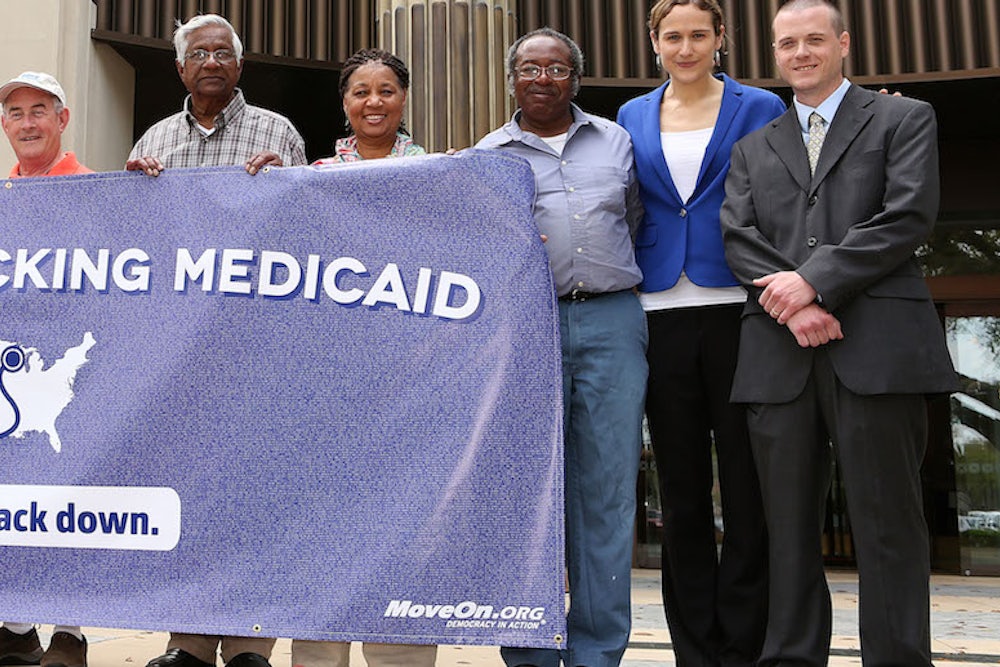Like many eleventh-hour strategies, the right's final offensive against the Affordable Care Act has a last-gasp quality to it. Where better-laid plans to defeat the ACA in Congress and via Constitutional challenge were fraught with ideological purpose, the challengers in Halbig v. Burwell are engaged in something much smaller. Their argument is merely that if you read a poorly drafted section of the statute out of context, it appears that the law doesn't contemplate subsidies in states that availed themselves of the federal government’s backstop, Healthcare.gov. Millions of people would lose their health insurance in service of teaching Congress a lesson about the importance of legislative draftsmanship.
That’s not a very becoming political argument, though, so the Halbig supporters have stapled a grandiose claim to their core challenge. Because many of the people who would lose their insurance would also qualify for an exemption from the law's insurance coverage mandate, they frame it as a principled campaign for liberty.
But many is not all. It's probably not even most. As University of Michigan law professor Nicholas Bagley noted on Tuesday, a conservative victory in Halbig would eliminate subsidies for everyone, but the hardship exemption would only apply to a subset. Many, many people—those above about 180 percent of the federal poverty level—would still be required to purchase insurance. It would just become more expensive for them. The exemption—the escape hatch to freedom—would only be available to those whose coverage costs more than eight percent of income: the poor, and near-poor. These are the people whose liberty conservatives claim to be fighting for—the people who were only able to purchase insurance because the subsidies made it affordable. The people who, as Bagley writes, would “be free to decline coverage that, without tax credits, they can’t afford anyhow.”
This kind of post hoc appeal to liberty long predates the Affordable Care Act, but it has become particularly salient in the fight against Obamacare as enrollment has grown and weakened traditional tools of opposition. When the Supreme Court made the Affordable Care Act’s Medicaid expansion optional back in 2012, it vouchsafed an old but typically losing conservative argument that using federal spending as an incentive to force state action can be unconstitutionally coercive—a freedom-crushing blow against states' rights. But the freedom the Court upheld two years ago looks, in effect, an awful lot like the freedom the challengers in Halbig claim to be fighting for. In both cases there’s something conspicuous about the people to whom these strange conceptions of liberty apply.

As of early April, per this Kaiser Family Foundation map, 19 states remained fully unwilling to consider Medicaid expansion. In the weeks since, Wyoming and Tennessee joined Utah and Indiana among GOP-controlled states working toward expanding Medicaid. So the chips are slowly falling. But they are falling along fairly predictable racial and income lines.
Tennessee was a genuine surprise, in that it isn’t lily white, and has fairly high rates of poverty. But the GOP-controlled states that have expanded Medicaid, or are considering Medicaid expansion, are pretty white relative to GOP-controlled states where expansion is out of the question. Deep Southern states, where poverty is most concentrated and black population rates approach 30 percent, aren’t calling up the Department of Health and Human Services in Washington to negotiate a conservative Medicaid expansion compromise. To the contrary, that's probably where resistance to the expansion runs strongest.
The story won’t be much different if conservatives get their way and ACA subsidies disappear in Healthcare.gov states. If you haven’t caught on by now, the conspicuous thing about the Medicaid freedmen and those who would be freed from the individual mandate is that they’re disproportionately black and poor. ACA rejectionism isn't enhancing their liberty at all.
But there’s something conspicuous about the Obamacare opponents posing as tribunes for liberty, too. They’re nearly all affluent white people, who take their own health insurance for granted and probably wouldn’t consider themselves liberated if a court or legislature took aim at it for any reason. And though their rhetoric suggests otherwise, they're waging the final Obamacare battles against poor people and minorities, not on their behalf.
